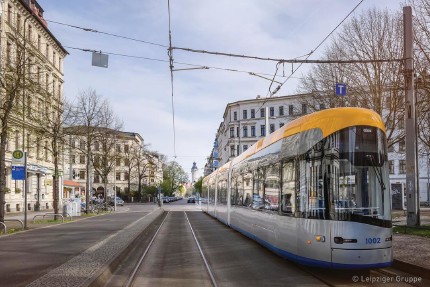Podcast "Project EfficienCE - How data takes over transport planning"
25.06.2022
The long-term cooperation project EfficienCE ended on 10 June 2022 with a Final conference in Leipzig, bringing together a total of 30 representatives of the project partners from Germany, Austria, the Czech Republic, Hungary, Italy, Poland and Slovenia to exchange knowledge about sustainable public transport and to introduce the implemented pilot projects. The project was funded with almost 2 million Euros as part of the Interreg Central Europe programme.
In Leipzig, use cases for more energy-efficient public transport planning were developed as part of the EfficienCE project by the Digital City department, the Office for Geoinformation and Land Use Planning and the Leipziger Verkehrsbetriebe (LVB).

Photo: Tram in the City of Leipzig (City of Leipzig)
For this purpose, data from the on-board computers of trams, energy data from Raspberry Pi sensors, municipal data on traffic area design as well as stop areas, crossing areas and external information from the German Weather Service (temperature, precipitation, wind, ...) were combined to improve data-based public transport planning.
By combining the different data sources, it becomes possible for the first time to collect continuous information on the interaction between the tram and the urban space to create added value for predictive maintenance, energy optimisation of the driving style, detection of interactions with individual traffic or optimised traffic space design.
Charlie Liebscher, Geo-Data Manager at the Office for Geoinformation and Land Use Planning of the City of Leipzig, and Conrad Jentzsch address this topic in the podcast episode "Urban Data in Networked Cities and Regions" and discuss how transport planning can be designed more effectively while protecting the environment and advancing digitalisation.
You can find out more about the project results and experiences from the city of Leipzig and the Leipziger Verkehrsbetriebe in the podcast HERE.
Author of the article: Sebastian Graetz, City of Leipzig
Background photo: City of Leipzig
